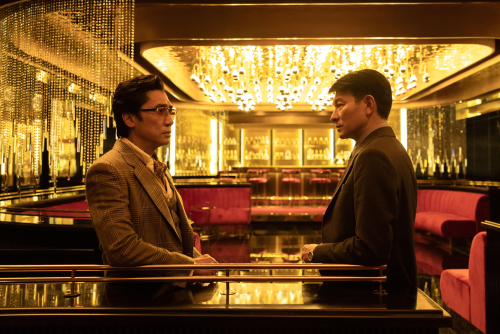
Courtesy photo
MOVIE REVIEW
The Goldfinger (2023)
Art imitates life; life imitates art; and sometimes art imitates art in ways which take decades to pay out. The new Hong Kong movie “The Goldfinger” does all of this and then some. The title is a reference both to James Bond and the myth of King Midas, the actors are referencing their previous movie together, 2002’s excellent “Infernal Affairs,” which was adapted into “The Departed” by Martin Scorsese, whose “The Wolf of Wall Street” was a clear inspiration for writer-director Felix Chong.
The trouble with being inspired by Mr. Scorsese is that he has does a very difficult emotional trick better than anyone else in cinema history. His story begins with an awful criminal doing horrible things with such glee that you are swept up in the adrenalin of the crime spree. But then he allows the full impact of the crimes their proper cumulative impact so that when the decline and fall follows, you are rooting for justice to be served, without the bait being obviously switched. Part of this is Mr. Scorsese’s knack of sending in a lawman, always played by an actor radiating a fundamental decency, at precisely the right moment. It’s like that moment you wake up next to a drunken hook-up; the person who seemed so attractive the night before is suddenly the worst mistake you ever made, and you’re grateful to anything that gets you out of there. Most recently this was done by Jesse Plemons in “Killers of the Flower Moon.” It’s all a matter of timing. Instead Mr. Chong introduces the bravery of his cop, Lau Kai-yuen (Andy Lau), before he introduces the cleverness of his kingpin, Henry Ching (Tony Leung). This is probably thanks to the Chinese censorship rules which don’t allow movies to imply that crime can pay. But “The Goldfinger” is also loosely inspired by a real situation in 1980s Hong Kong, the decade when the city exploded with new money and turned itself into the international financial powerhouse it remains. Perhaps this history is so well-known locally the filmmakers didn’t think they needed to maintain any suspense. But that means Mr. Scorsese’s style shouldn’t have been copied.
The opening scenes, of Henry taking up illegal residence in the city, focus a great deal on the former skyline, which makes its own point. He initially only finds work as bait in a con to convince a potential buyer that the low-value land for sale is actually a hot property. Instead he meets the mark on his own and not only negotiates the sale, but skims off millions for himself and for the guy who got him the job. Henry’s business acumen is rarely shown so directly again. Instead we’re off the races of private kitchens in penthouse offices, barely-dressed women writhing on boardroom tables and trading-floor brokers watching stock prices climb, and climb, and climb. However it’s all told as flashbacks as part of interrogation scenes, with Mr. Lau as the head of an enormous inter-agency operation working relentlessly to expose Henry’s wrongdoing. There’s a terrifying scene in a parking garage, centered around Mr. Lau’s family including an infant son, that makes plain the seriousness of the stakes. But unfortunately the framing exercise removes the true dramatic tension. It’s as if the famous final day sequence in “Goodfellas” was from the point of view of the cop in the helicopter.
Now having said all that, who cares. If Mr. Leung is a tiger then Mr. Lau is an eagle; and it’s just so great to see them in combat again. Mr. Leung is one of the world’s greatest movie stars, who contains within himself an unpredictability that makes him unbelievably watchable. He’s combined this enigmatic appeal with a taste for the unusual (“Happy Together” being the specific movie this critic is thinking of, a gay love story set in the Chinese immigrant community in Buenos Aires, i.e., not exactly an obvious choice for a massive movie star to make at any stage of their career) as well as the language skills to work internationally. Audiences will follow him anywhere; and this gives him a confidence that only that level of uncurdled stardom contains. There’s a brief sequence of rumors about how Henry got his initial financing – drugrunning in the Golden Triangle? shoeshopping with the first lady of the Philippines? a favor for the K.G.B. in the middle of a Moscow winter? – and Mr. Leung makes all of these tales alarmingly plausible.
The kinetic sequences of the expansion of Henry’s empire, where supertankers are toys in his hands and property deals are pages in pop-out books, give financial fraud an unusual visual panache as the lines between financial genius and thuggish criminality blur and appetites can never be sated. And on the other side is Mr. Lau, less well known outside of the Cantonese-speaking world, with a screen presence as palpable as Mr. Leung’s, though a sharper, less affable one. The push and pull between the two of them would be worth seeing even with the weakest script, and their antagonism gives this tale of a hunter and his prey all the drama it needs.
At one point a policeman says, “Wealthy men become amoral, but amoral women become wealthy.” I look forward to the dissertations to be written about this phrase.
Comments